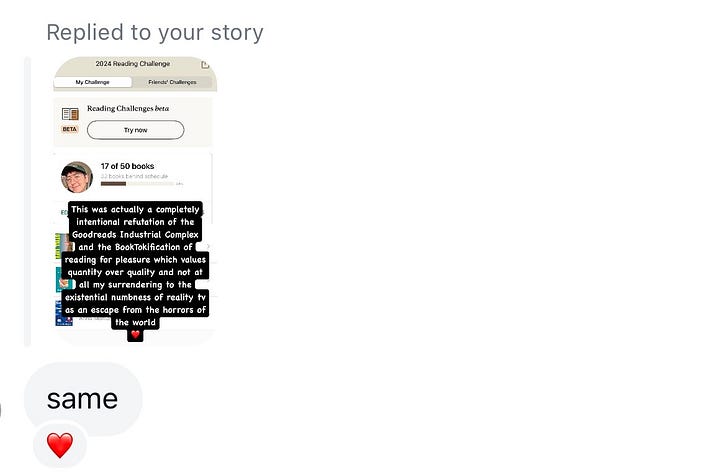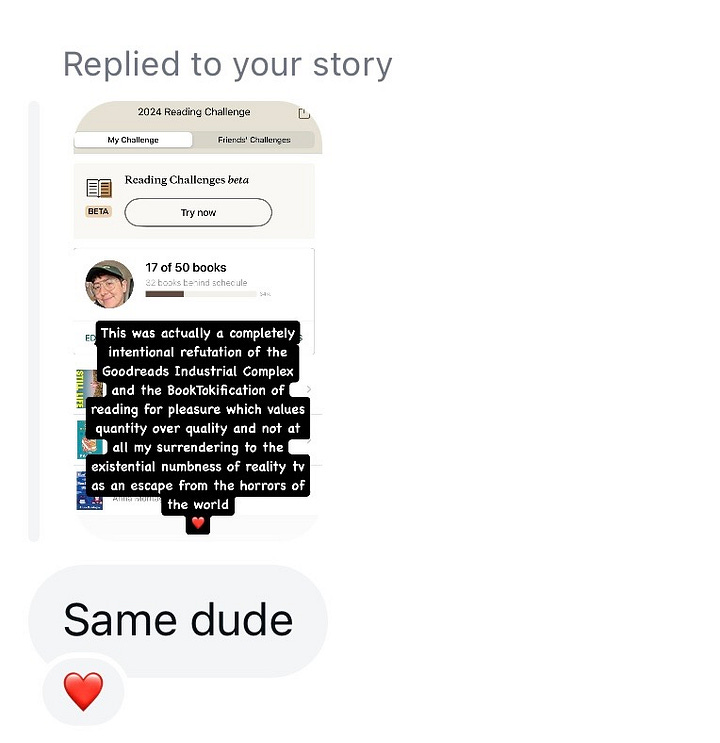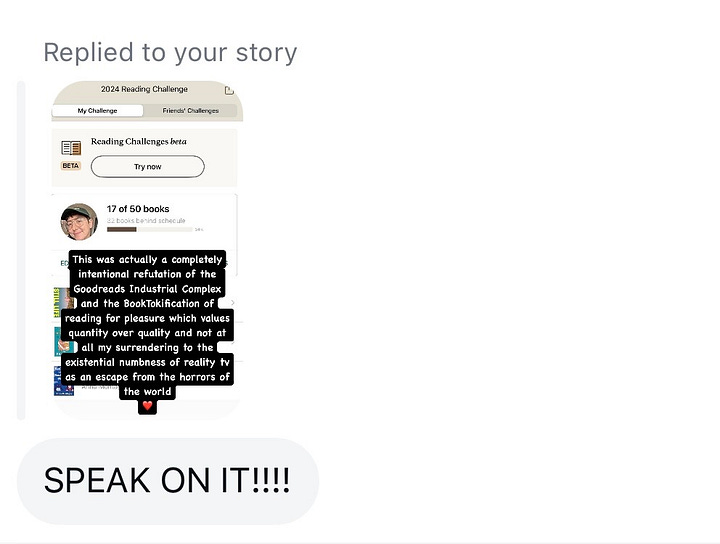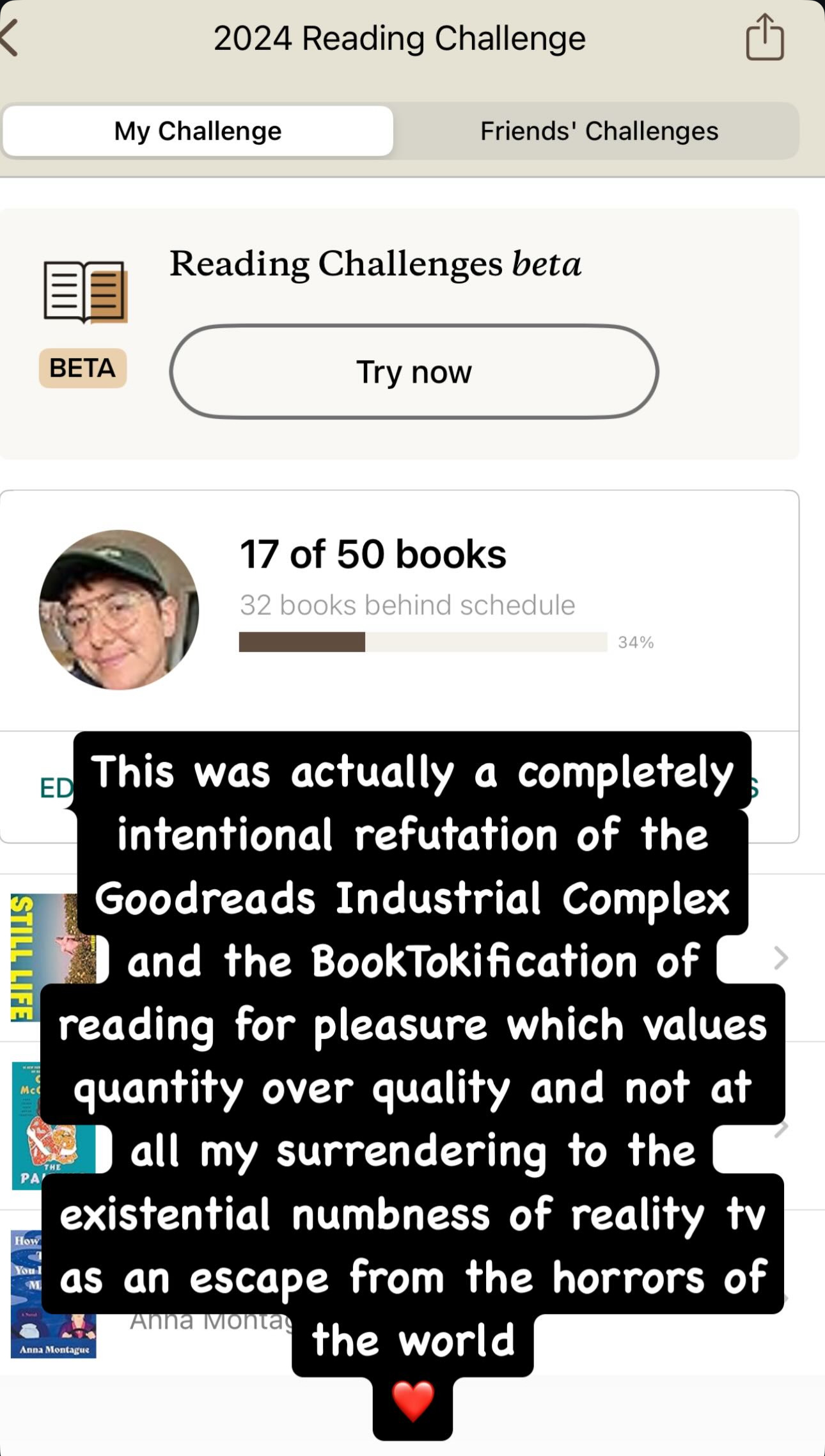In Favor of Reading Less
Or, if you read a book and don’t post it on Goodreads, did it even count?
The other day, I posted a screenshot of my Goodreads Reading Challenge results, showing the lack of books I’d read this year. Out of my 50 book goal—already low for me—I had only read 17 (As of this writing, I am on number 18! There is hope for me yet!). There were so many factors contributing to this—dread, top surgery, moving in with my partner, Trump, trans, the list goes on—but overall it was for lack of trying. I didn’t want to; I—as Bartlbey famously said—preferred not to.
As an editor, “reading for fun” has become—for me—the equivalent of a kid gorging themselves on ice cream. On vacations, holidays, slow weeks, I’d pick a stack and stick to it even as the “pleasure” aspect of it began to feel more and more like a chore. Who knows when you might get the chance again, I told myself, so you might as well cram it in until you feel sick and the urge is gone.
So, I posted my Goodreads goal, thinking I would get the usual publishing responses, or shames. To my surprise—in addition to the fellow editors, marketers, and agents— it was BookTokers responding too, everyone chiming in with their goals to read less—or nothing at all.




Was our next era one of the Book Deinfluencer? It seems we all want to read less and more slowly—savor rather than race—so why are we still publishing so many books?
wrote a great article about this—what if our output was reduced, not at the expense of authors but in service of them, and also in service of those who work on the books? But it’s not just about those who work in the book pipeline—what if it’s the best for consumers, too? I can’t help but think about that jam study on the paradox of choice—how the illusion of endless options is far more anxiety inducing than any potential excitement.There has been discourse on short books, as well as on the idea of books that are too short (Unpublishable, apparently—though I feel that has been proven untrue time and time again). I’ve had authors anxiously email me mid-revision, asking me if their book was too long on word count alone, to which I’ve replied that there is no way of telling whether a book is too long—or too short for that matter—unless I’ve read it. A book should be as long as it needs to be—or as short and concise to play out the narrative as needed.
But, at the root of that discourse is a fear about our attention spans—the TikTokification of books, reality TV brains, Quibi, shorter movies, even the movie trailers are shorter!—but there is a difference in consuming different media, is there not? I for one have found myself turning more and more to Substack, reading an essay or two when I’m itching to stare at my phone, but know that Twitter or BlueSky or Instagram will just make me more depressed. I can only imagine that the sum of the characters of the tweets I’ve read would far outpace the one or two longform essays, but it’s the quality that satisfies me, not the quantity. Popcorn for dinner, etc. etc.
Maybe the kids are alright, maybe the kids are just overwhelmed. When I was a kid I got hit in the head by plenty of volleyballs and soccerballs on the sideline with my head buried in a book. Even now, I struggle with directions in my hometown; I spent every car ride reading in the backseat. If I had had an iPad then, would I have been watching Cocomelon on my flights instead of reading the Jodi Picoult book I had purchased in the airport bookstore? I’m not sure.
But does it really matter, these exercises? What is here is here–social media, TikTok, AI–so is it worth going back in time to reinvent our attention spans? Is there a way to accept reality rather than catering to it?
Obviously, it is in my own self interest for people to be reading more books, or rather buying more books (I guess it’s just as good to keep books as decor as it is to purchase them with the intention of reading them!). Competitive readers might pay my salary—or to put it in reverse, the BookTok Deinfluencers might destroy everything—but I don’t think that’s quite true. I think the competition of reading and showing your work might be making those of us who read worse readers, and those of us who don’t even more anxious and guilty.
***
At my last powerlifting session before the holiday break, the question put forth during our routine stretches was one of goal setting in the lead up to the new year. Folks went around with their various resolutions—don’t give away your heart on a first date, show up to class, eat more protein, get gayer and more annoying, etc.—until we landed on the final person, who announced that they had read 15 books that year and wanted to do the same in the next. I felt that ugly churn of judgement take root—only 15 books?!?—which was quickly overridden by everyone congratulating the reader.
The coach chimed in and adopted that resolution as her own on the spot. She hadn’t really read in years—she admitted—but when she was a kid she would read constantly. It had become so anxiety inducing over time. She felt like she had to read something Important in order to read at all, but then she would get intimidated or stressed by the amount of options and so instead read nothing. How many times had I decided to “scroll on Netflix” to find a movie to watch with my partner and ended up—30 trailers later—nearly pitching the TV out the window?
***
Two weeks later and my edits were turned in and the out of office auto-reply was up. The holiday cookies were baked, the bags packed, the cat fed, the apartment swept—4-5 episodes of The Ultimatum binged—so, I began my usual practice: gathering the stacks of unread galleys from around the bedroom and sorting them into piles.
In Long Island at my partner’s parents’ house, I took out Still Life by Katherine Packert Burke, and was relieved to find myself able to read. It was a pleasurable book in itself—the fumbling characters, the yearning, the cleanness of the prose—but I also didn’t resent the page like I often did during the periods when I worked. After all, if I could be reading an endless slew of submissions, or editing, or reading short stories and articles from the best and the brightest, why would I be reading some regular published book? And if that book didn’t have me in a chokehold, why not preserve my weary literate brain for what I get paid for and instead listen to techno, dumbly scroll social media, and stare blankly at the subway ads whilst on my commute to work? I would—and still do—look with wonder at commuters reading books with seemingly no ulterior motive. Where do they even find these things? It’s like seeing someone do your geometry homework for fun.
But here I was, reading—reading!—letters making up words on a page strung together by someone and edited, then, by someone else. I wasn’t reading with the eye of someone trying to scan for gold or getting stuck in the production mechanisms of the book, I was just consuming it like a consumer, like a reader.
And then there were only 20 pages left, and I felt that familiar rush—crushing a book in 24 hours! I was back, baby!—and with it, a scanning of the words, a reading without really reading, without meaning or images—just text on a page. I caught myself—it wasn’t the author, it was me—and went back. I could put down the book and help with setting the table, return to the book after dinner or—god forbid—the next day, but I couldn’t free myself of that competitive urge to slam it closed, race upstairs, and power through another book. After all, if I didn’t finish it now, would I ever read it—or anything—again?
I did finish it, slowly, though not as slowly as I could have. I enjoyed it a lot, the guilt of being unhelpful around the house quickly usurping the guilt of squandering my stack of unread books.
But, before I did, I turned to Goodreads. Hovering over the button that would acknowledge I finished the book, adding it to my underwhelming 2024 tally. There would be no confetti for me this year—but should I wait, lie to myself and my Goodreads community? Press finish on January 1 and start 2025 with the chance to reach my goal? Bank my books for a race I could actually win?
There are so many books I’ll never read—just like there are so many books we publishers proselytize about that I’ll never even open. Books that have become something amorphous and intimidating—not quite in prose, like my coach had mentioned, but in sales and attention and general recognizability. But I have to believe that there’s a book for everyone—in the same way that someone’s Ben & Jerry’s flavor gone sticky with freezer burn is someone’s favorite, that there’s a #1 fan for every small town band.
So I did click “finish,” and closed out the app. And I did sprint upstairs to add the next book to my “currently reading” queue and then returned to being a helpful member of society. Maybe I would gorge myself on the short book later that night—like adding a five-minute task to your to-do list just to strike it off. Maybe I would linger on each page, reading a paragraph at a time, setting it aside, taking a sip of seltzer, and stretching before picking the book up again. Maybe I would leave it spread out on the couch —spend the next few days rolling around with my partner’s family dogs, watching Christmas movies, scrolling until my thumbs cramped. Maybe this short book would linger on my Goodreads alongside the hefty nonfiction I had been working through slowly, the books that lacked the instant gratification of a quick strike through—Virginia Sole-Smith’s Fat Talk, Naomi Klein’s Doppelganger—lingering until I, embarrassed, removed it from my digital shelf, for no reason other than what they did to my stats, spiraling me out into another fit of unreading.
In any case, it wasn’t for me to judge—after all, no one else seemed to care either. Perhaps I would read 100 books in the next year, breaking even my 2021 record. Maybe I would scoop out my brain with a melonballer and start Real Housewives of New Jersey from the beginning.
Or, maybe, I would just do my best. I would survive as best I could, support my communities, soothe myself against the existential political beyond and cling to whatever brought me comfort—whether that be a book as a talisman or something else.
Regardless of how many books I would or wouldn’t read, I was going to be just alright. Whatever I did or didn’t do, I wouldn’t be setting any goals this year.
Regular Galley Brag will return next Friday! Until then, have a happy new year : )








just hell ya to all of this. you’re spot on! obviously some people read super fast and that’s great but you really have to wonder who it’s for when people are gamifying their reading like that. is it fun? are they getting anything out of it? I saw a tiktok the other day that was a girl out with her friends and she was like “wish I was home with my book” — ok, sure, it’s fun to be introverted, but you read 200 books a year, have u considered being present for a second :) anyway here’s to illiteracy in 2025 I guess
I loved this! The reading less revolution going on rn is interesting and I think just a general lethargy about life? Probs a combination of post covid & being fed up of the gamification of reading online. I think the moralising about numerical goals is dumb and I’m glad that people are (generally) holding less weight on them. I read loads but my life is in a particular season rn and when it changes I’m sure I’ll read a lot less and that’s fine.
Short books get such a bad rap!!! What do you MEAN it’s not a ‘real’ book?! I think it’s even more impressive to move me in 100 pages rather than 600.
I love your line about how no one cares. It’s true tho - truly no one else cares about how much you’ve read, instead it’s just about what you read !!!! You’re a reading less inspiration Ezra xox